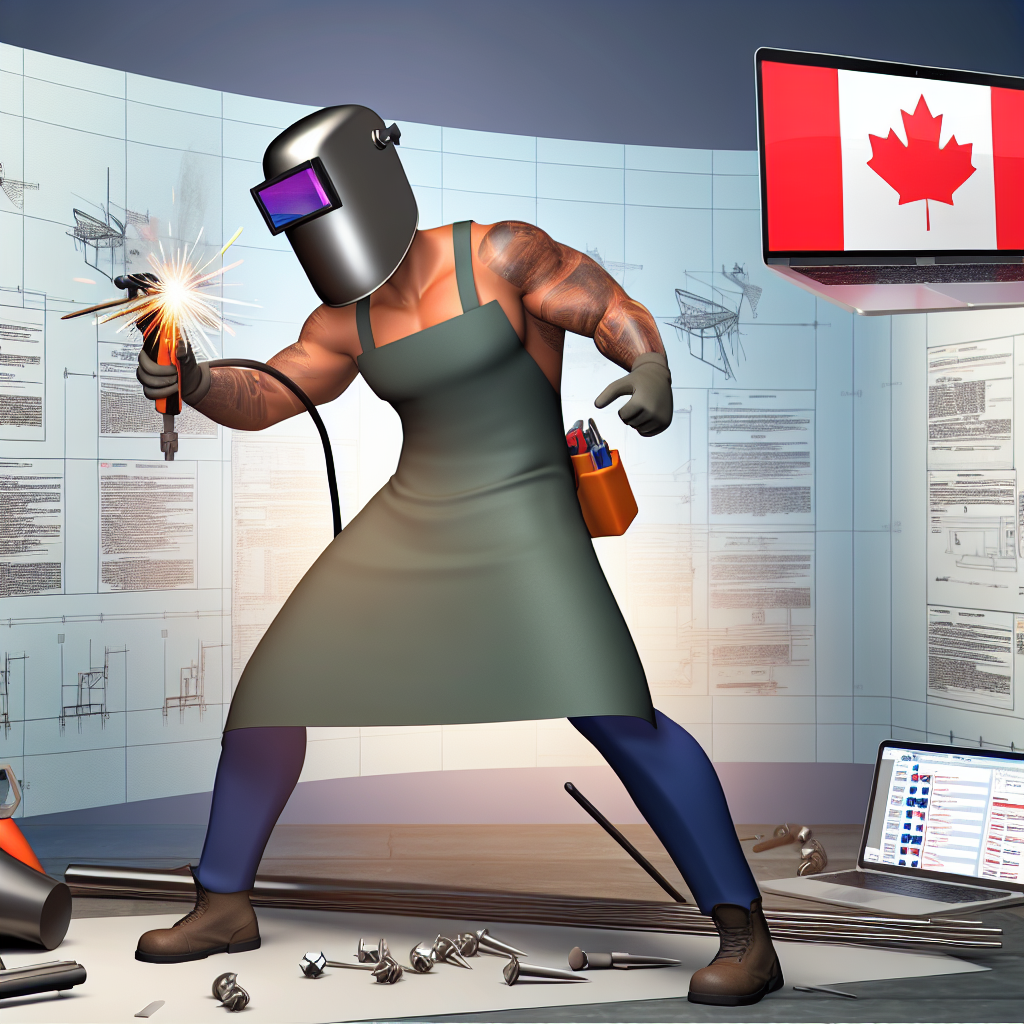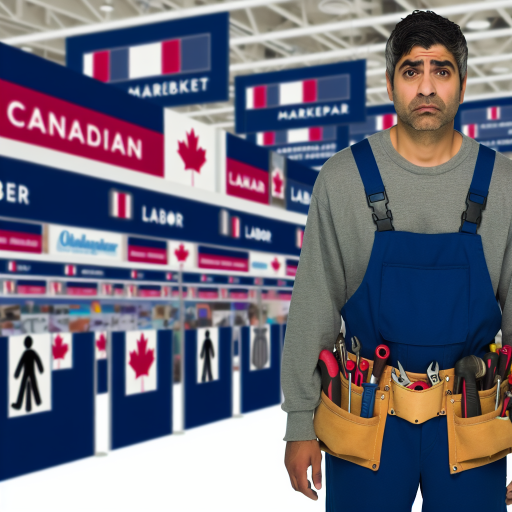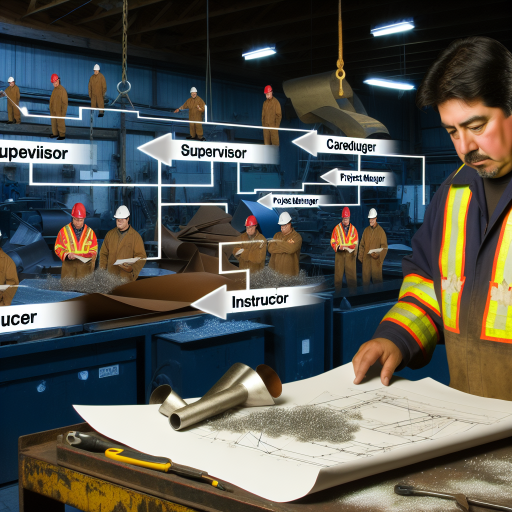Understanding Metal Fabrication
Overview of the Industry
The metal fabrication industry plays a crucial role in manufacturing.
It involves the process of creating metal structures by cutting, bending, and assembling various materials.
Essentially, fabrication converts raw materials into usable parts and components.
This industry serves diverse sectors such as automotive, construction, and aerospace.
As a result, it drives significant economic contributions globally.
Moreover, Canada takes pride in its robust metal fabrication industry.
Numerous skilled professionals work in this dynamic field.
Key Job Roles in Metal Fabrication
Metal fabrication offers various career pathways for entry-level job seekers.
Common positions include fabricators, welders, and machinists.
Fabricators design and assemble metal products using blueprints.
Welders use high heat to fuse metal sections together.
Machinists operate machines to shape metal parts to precise specifications.
Skills Required in the Industry
Entry-level roles in metal fabrication require specific skills for success.
Basic mechanical skills are essential to perform tasks efficiently.
Additionally, attention to detail ensures quality and accuracy.
Moreover, understanding safety standards is crucial for workplace safety.
Learning to read technical drawings enhances effectiveness in various roles.
Opportunities for Advancement
Metal fabrication not only offers entry-level positions but also provides growth opportunities.
Many individuals start in entry-level roles and climb the career ladder over time.
By gaining experience, fabricators can pursue specialized roles.
For instance, becoming a lead fabricator or quality control inspector are common advancements.
Continuing education and certification can further enhance career prospects.
Required Skills and Qualifications for Entry-Level Metal Fabrication Jobs
Technical Skills
Familiarity with welding techniques is essential for metal fabrication positions.
Basic knowledge of metal properties helps in choosing the right materials.
Understanding technical drawings is crucial for executing project specifications.
Unlock Your Career Potential
Visualize a clear path to success with our tailored Career Consulting service. Personalized insights in just 1-3 days.
Get StartedBasic proficiency in operating fabrication tools enhances job performance.
Additionally, familiarity with safety procedures improves workplace security.
Soft Skills
Strong communication skills foster better teamwork in fabrication settings.
Attention to detail ensures high-quality work and minimizes errors.
Problem-solving ability helps resolve issues that arise during fabrication.
Time management skills are essential for meeting project deadlines.
Moreover, a willingness to learn contributes to professional growth.
Educational Qualifications
A high school diploma or equivalent is typically required for entry-level roles.
Completion of a metal fabrication or welding program boosts employability.
Additionally, relevant certifications may enhance job prospects.
Industry Knowledge
Awareness of current industry trends is beneficial for job seekers.
Knowledge about tools, machines, and their applications is advantageous.
Understanding regulations related to safety and quality standards is essential.
Finally, a grasp of market demands can improve job performance.
Where to Search for Job Openings
Online Job Boards
Online job boards are excellent resources for finding entry-level positions.
Many companies post job openings directly on these platforms.
Popular websites include Indeed, Glassdoor, and LinkedIn.
You can filter searches by location and experience level.
Additionally, setting job alerts can keep you updated on new postings.
For a more specialized search, consider niche sites such as FabricationJobs.com.
These sites focus specifically on metal fabrication and related fields.
Local Resources
Local resources provide valuable connections to job openings.
Community job fairs often feature local manufacturers seeking talent.
You can network with industry professionals at these events.
Trade schools and vocational programs usually have job placement services.
Contacting local employment agencies can also uncover hidden opportunities.
Networking within your community can lead to job leads and referrals.
Social Media Platforms
Social media platforms offer unique opportunities for job seekers.
Joining industry-related groups on Facebook can be beneficial.
These groups often share job postings and resources.
LinkedIn remains a powerful tool for professional networking.
Engaging with other professionals can enhance your job search.
Don’t forget to follow companies you’re interested in; they often post openings directly.
Company Websites
Many companies post job openings on their own websites.
Visit the careers page of companies you admire or wish to work for.
Regularly checking these sites can help you stay informed.
Some companies may not advertise on job boards, so direct searches are crucial.
Additionally, you can learn about company culture through their websites.
Delve into the Subject: Exploring Advanced Techniques in Modern Bricklaying
Networking in the Metal Fabrication Industry: Building Connections and Finding Mentors
The Importance of Networking
Networking plays a crucial role in securing metal fabrication jobs.
It opens doors to opportunities you might not find on job boards.
Building a professional network can enhance your career growth.
Furthermore, connections often lead to mentorship opportunities.
Identifying Industry Events
Attend industry-related events to meet professionals in your field.
Trade shows and expos are excellent networking platforms.
Local meetups can also help you connect with industry peers.
Engage with speakers and attendees during these events.
Utilizing Online Platforms
Leverage social media to develop your professional network.
LinkedIn is a vital tool for connecting with industry experts.
Join groups specific to metal fabrication for networking opportunities.
Participate in discussions to increase your visibility.
Finding Mentors in the Industry
A mentor can provide guidance and insights into the industry.
Seek someone with experience in metal fabrication.
Approach potential mentors with a clear intention.
Ask for advice, not just job opportunities.
Building Meaningful Relationships
Focus on quality over quantity when building your network.
Develop relationships based on trust and mutual benefit.
Follow up with industry contacts after initial meetings.
Maintain connections through regular communication.
Joining Professional Organizations
Consider becoming a member of professional organizations.
These associations often provide networking events and resources.
They also offer access to industry news and job postings.
Networking within these groups can be invaluable.
Engaging with Educational Institutions
Collaborate with local colleges that offer metal fabrication programs.
These institutions often have connections with industry employers.
Participate in workshops and seminars to gain knowledge.
Establishing ties with educators can lead to job referrals.
Gain More Insights: Challenges and Rewards of an Ironworker’s Career
Creating an Effective Resume and Cover Letter for Metal Fabrication Positions
Understanding Key Components
Your resume needs to be clear and concise.
Focus on relevant skills and experiences in metal fabrication.
Use bullet points for easy readability.
Highlight any certifications or training received.
A strong cover letter complements your resume.
Customizing Your Application
Tailor your resume for each job application.
Identify keywords from the job description.
Incorporate these keywords throughout your resume.
For your cover letter, explain why you are a strong fit.
Connect your experience directly to the employer’s needs.
Showcasing Relevant Skills
List technical skills related to metal fabrication.
Include welding, machining, and blueprint reading.
Emphasize any hands-on experience.
Mention tools and equipment you are proficient with.
Describe your problem-solving abilities in previous roles.
Structuring Your Resume
Start with a strong summary statement.
List education, certifications, and relevant work experience.
Be sure to format dates and job titles clearly.
Avoid using lengthy paragraphs; keep it brief.
Ensure consistency in font and style throughout the document.
Writing Your Cover Letter
Begin with a professional greeting.
State the position you are applying for right away.
Clearly express your interest and enthusiasm.
Include a specific example of your work experience.
End with a call to action, encouraging follow-up.
Proofreading and Final Touches
Carefully proofread for grammar and spelling errors.
Ask a friend or mentor to review your application.
Make sure your contact information is accurate.
Consider using a professional format for both documents.
Finally, ensure both documents are neatly formatted and easy to read.
Gain More Insights: Innovative Techniques in Modern Metal Fabrication

The Importance of Certifications and Training Programs
Enhancing Employment Opportunities
Certifications play a crucial role in the metal fabrication industry.
They demonstrate your skills and commitment to potential employers.
Employers often prefer candidates with recognized certifications.
These documents can enhance your employability significantly.
Types of Relevant Certifications
Several certifications are important for newcomers in metal fabrication.
The Canadian Welding Bureau (CWB) offers certifications for welders.
Moreover, the Fabricators and Manufacturers Association provides valuable resources.
Additional training can improve your competitive edge in the job market.
Benefits of Training Programs
Participating in training programs is highly beneficial.
These programs help you gain hands-on experience in core skills.
They also enhance your understanding of safety protocols.
Furthermore, many training programs offer networking opportunities.
Connecting with industry professionals can open doors to job opportunities.
Available Training Resources in Canada
Numerous institutions offer training programs across Canada.
Community colleges provide accessible and affordable options.
Online courses from recognized platforms are also available.
Many companies offer apprenticeships that combine training and work experience.
Making the Most of Your Certifications
Once you earn your certifications, display them prominently on your resume.
Share your credentials on professional networking platforms like LinkedIn.
Consider joining professional associations in the metal fabrication industry.
These actions can lead to job opportunities and professional growth.
Find Out More: Top Tools Essential for Bricklayers in Canada
Preparing for Interviews: Common Questions and How to Ace Them in Metal Fabrication
Understanding Common Interview Questions
Interviews often begin with basic questions about your background.
Employers want to know about your education and work history.
They may ask why you are interested in metal fabrication.
Be prepared to articulate your passion for this field.
Technical Skills and Knowledge
Expect questions about your understanding of fabrication processes.
Interviewers might ask about specific tools and equipment.
Familiarize yourself with welding, cutting, and assembly techniques.
Demonstrating your technical knowledge can set you apart.
Problem-Solving Scenarios
Employers often present hypothetical problems to gauge your skills.
Listen carefully to the scenario and ask clarifying questions.
Think out loud to show your problem-solving process.
Propose practical solutions based on your previous experiences.
Teamwork and Communication
Metal fabrication requires collaboration with colleagues.
Interviewers may ask about your experiences working in teams.
Be ready to discuss instances where you successfully collaborated.
Highlight how strong communication is essential in fabrication.
Preparing Your Own Questions
Hiring managers appreciate candidates who ask insightful questions.
Prepare questions about company culture and team dynamics.
Inquire about potential career advancement opportunities.
Showcase your interest and commitment to the role.
Practicing for Success
Practice common interview questions with a friend.
Record yourself to analyze your body language and tone.
Seek constructive feedback to improve your performance.
Simulated interviews can build your confidence significantly.
Day of the Interview
Choose professional attire to make a favorable first impression.
Arrive early to give yourself time to relax before entering.
Bring copies of your resume and a list of references.
Stay calm and remember to engage and smile during the interview.
Exploring Apprenticeship Opportunities
Importance of Apprenticeships
Apprenticeships are vital for newcomers in metal fabrication.
They provide essential hands-on experience to learn the trade effectively.
Moreover, these opportunities often lead to full-time employment.
Finding Apprenticeship Programs
Start by researching local trade schools and community colleges.
Many institutions offer apprenticeship programs in metal fabrication.
Furthermore, check with industry associations for more resources.
Application Process
Prepare a resume highlighting your skills and interests.
Include any relevant experience, even if indirect.
Next, submit applications to multiple programs to increase your chances.
Interview Preparation
Research common interview questions for apprenticeships.
Practice your responses to demonstrate your eagerness and knowledge.
Remember to express a willingness to learn and grow in the field.
Benefits of Completing an Apprenticeship
Completing an apprenticeship enhances your skills significantly.
It also expands your professional network within the industry.
Additionally, you will gain confidence in your abilities and techniques.
Additional Resources
2.1 Million Manufacturing Jobs Could Go Unfilled by 2030 – NAM




